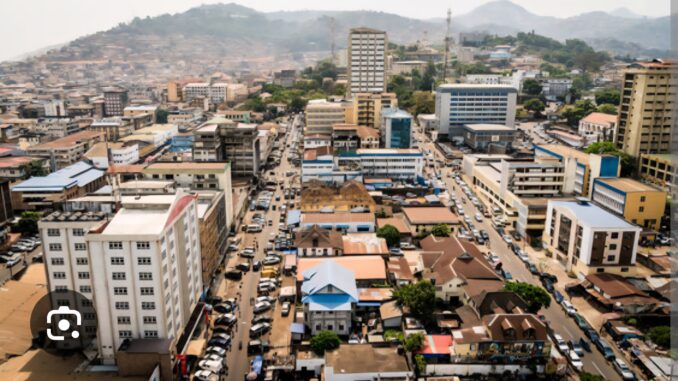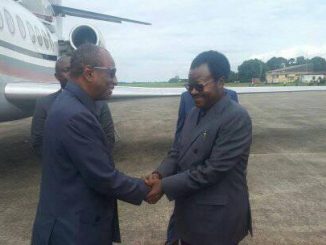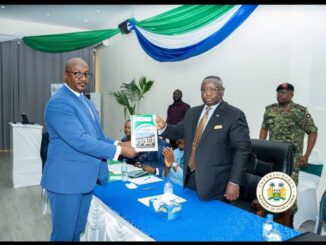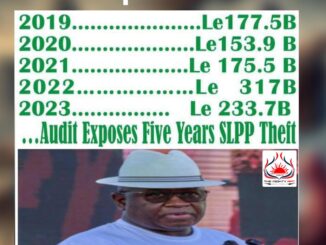
Freetown: Our Undivided Soul, Our Enduring Legacy
By Jeneba Sesay
ABUJA, Nigeria – June 17, 2025
There are moments when a proposal emerges that seems, on the surface, to offer administrative convenience or political efficiency. It’s wrapped in lofty language of reform, of modernization, of bringing government closer to the people.
The debate it triggers is not immediately explosive but quietly unsettling. Whispers begin to circulate about borders, maps, new jurisdictions. About Freetown.
At first, one tries to approach it dispassionately. What if this was just another technocratic proposal? What if division was indeed the answer to our developmental challenges? But the deeper one probes, the more one listens, the more one reflects on what Freetown is, not merely as a city but as a living embodiment of our history , the more the unease grows. Then comes the ache: deep, instinctive, undeniable.
My heart bleeds at the mere whisper of Freetown’s proposed division. This is more than just a city; it’s the crucible of our nation’s history, a vibrant tapestry woven with threads of resilience, liberation, and unparalleled beauty. To contemplate its dissection is to contemplate tearing apart the very soul of Sierra Leone, an act that would leave an irreparable scar on our collective identity and fundamentally betray its profound historical and economic significance.
A Legacy Etched in Freedom
Freetown’s foundation is etched in the annals of freedom. Built by freed slaves, it stands as a beacon of hope and a testament to the human spirit’s yearning for liberty. Every street, every corner, and every historic building reverberates with the echoes of those who sought refuge and built a new life here. This historical singularity is our birthright, a story that defines and unites us. How can one even conceive of cleaving such a profound legacy? To divide Freetown is to fracture the narrative of our nation’s genesis, rendering it incomplete and diminished.
A Unique Beauty, a Priceless Economic Lifeline
Beyond its historical gravitas, Freetown possesses a unique and breathtaking beauty. The verdant mountain slopes cascading into the azure Atlantic, the bustling markets alive with the rhythm of daily life.These are the hallmarks of our city. Even though the iconic Cotton Tree no longer towers as it once did, its spirit lives on, having for centuries stood sentinel over generations of freed slaves, a powerful symbol of hope, struggle, and a testament to the birth of our nation.
Our geographical uniqueness, with its natural harbor and stunning vistas, is an integral part of what makes Freetown, Freetown. Imagine the geographical mutilation if divided. This thought alone highlights the absurdity and inherent instability of such a proposal, especially considering the inevitable conflict over resources and the crucial location of the State House, the seat of power.
The Astronomical Cost of Division
Let’s not shy away from the monumental, almost unimaginable costs associated with such a reckless, politically motivated endeavor, devoid of national development considerations. The logistical nightmares of redrawing boundaries, reallocating resources, and re-establishing public services would be astronomical. The planning and administrative complexity would cripple our already strained national budget for decades, diverting crucial funds from education, healthcare, agriculture, and infrastructure projects that genuinely benefit our people. This isn’t just about lines on a map; it’s about disrupting every facet of daily life for hundreds of thousands, creating chaos where a functioning, albeit imperfect, system currently exists. The true cost extends beyond monetary figures; it encompasses the erosion of social cohesion, the generation of resentment, and the creation of new layers of bureaucracy.
A Political Plot, Not a Solution
Let’s be brutally honest: this talk of division isn’t born from genuine concern for Freetown’s residents. It’s a thinly veiled exercise in political machination, a cynical maneuver to consolidate power or gain advantage. The deeply political nature of the Freetown City Council’s mayorship often means any proposal to divide the city can be interpreted as an attempt to undermine or control a key political office, particularly if held by an opposition party. This is a distraction from the real challenges facing our city — unemployment, sanitation, access to clean drinking water, sustainable electricity, and effective urban development. These are the issues that demand our collective attention and resources, not a divisive and destructive proposal that serves only narrow political interests.
Freetown’s Unique Context
Some might compare Freetown to the City of London, suggesting that if London can have boroughs, why not Freetown? This comparison is not only flawed but fundamentally disrespectful to Freetown’s unique context. London’s boroughs evolved over centuries, largely as administrative subdivisions within an established, unified metropolitan area. Freetown, however, is a singular entity, historically and geographically. Its character isn’t a collection of disparate parts but a cohesive whole. To impose an arbitrary division on Freetown is to ignore its organic growth, its shared heritage, and its intrinsic interconnectedness. It’s like proposing to divide a single, beating heart into two separate organs and expecting both to thrive.
Empowering, Not Dismantling
Instead of this destructive path, we must focus on empowering the Freetown City Council (FCC) and its localities. The central government must prioritize expanding basic services across the city, not dividing it. True progress lies in strengthening local governance, devolving appropriate powers and resources, and fostering genuine community participation. This can not be done by dividing communities. There must be huge investment in capacity building, enhancing transparency, and ensuring accountability within our existing structures, not dismantling the very foundation upon which our city rests.
Blueprint for a United and Empowered Freetown
To empower Freetown and prevent the government from tearing our city apart, we must collectively pursue a comprehensive blueprint for strengthening local governance. While challenges persist, the persistent demand and collective effort of Freetown’s residents are essential. I suggest the following ways to build on the council’s work rather than seeking to divide the city and its people:
* Strengthening Fiscal Decentralization: Granting the FCC greater financial autonomy is a critical and undeniable necessity. While the FCC generates revenue from property rates, business rates, and market dues, it heavily relies on donor partners because local resources are insufficient to meet all resident needs. Central government support can best be described as often epileptic and erratic, with financial transfers frequently delayed and limited. This unpredictability, coupled with the central government’s unwillingness to devolve functions that could expand the council’s revenue base, highlights the urgent need for true financial independence.
* Devolving More Functions and Responsibilities: Functions like land use planning and building permit issuance, mandated by the Local Government Act, in practice struggle to be fully exercised by the councils The clear lack of political will and weak commitment to transfer funds to councils are major obstacles undermining their ability to perform effectively. According to reports, funds for devolved functions have yet to be transferred this year since January. The FCC is confident it can effectively handle any devolved duties.
* Enhancing Citizen Participation and Oversight: Mechanisms for high-level community participation are always in place, including ward-level consultations and extensive engagements, as demonstrated in the development of the “Transform Freetown Transforming Lives” development plan. These mechanisms are considered very effective. Furthermore, the FCC ensures transparency through audits, annual reports detailing fund utilization, and the Mayor’s constant public engagements, all indicative of the Council’s openness.
* Investing in FCC Capacity Building: While resources for continuous professional development for FCC personnel are not as would be needed, there’s a clear understanding that specific training and technological upgrades would significantly enhance efficiency and effectiveness.
* Fostering Inter-Governmental Dialogue and Collaboration: The FCC’s relationship with central government ministries could best be described as seemingly good, though mindful of political realities. One thing is clear: the Mayor is committed to collaboration, based on the need for an improved sense of working together with the Ministry of Local Government and Community Affairs. However, she will always speak out when the interests of Freetownians are not aligned with certain actions.
* Sustained Public Awareness and Advocacy: While the government has attempted to give the impression that there were consultations on the planned division, the Mayor has been very firm in her rejection. She started by issuing an open letter and then formed a broad-based coalition of civil society, lawyers, and community groups, addressing the media in a press conference. This advocacy will continue through an upcoming town hall meeting, rallying public support. The media, civil society, and religious leaders should also be part of this process by adding their voices.
A Unified Appeal
To every resident of Freetown, and indeed to every Sierra Leonean, I make this passionate appeal: Lend your voice to this critical issue. This isn’t merely a local debate; it’s a national crisis. The proposed division of Freetown threatens our heritage, our economy, our social fabric, and our very identity as a nation. Let’s stand united, as our ancestors stood united in their quest for freedom and reject this divisive proposal with every fiber of our being. Freetown is our undivided soul, our enduring legacy. Let’s preserve it, nurture it, and ensure that it thrives as a beacon of unity and progress for generations to come.





Leave a Reply